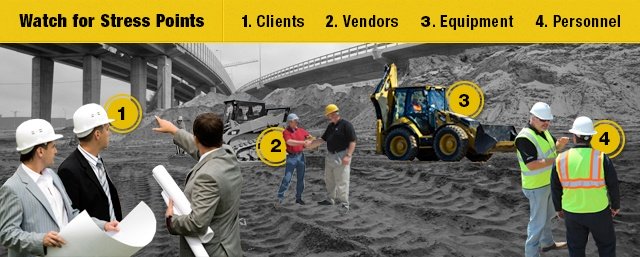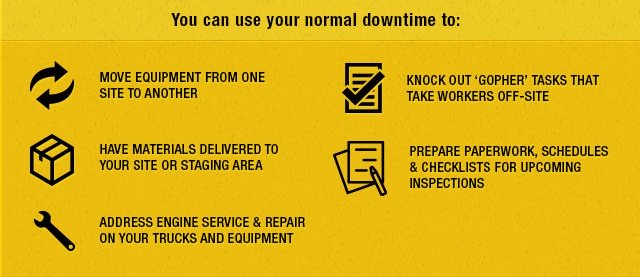It's a no-brainer for construction companies to work to improve their uptime. So what does this mean exactly? Simply put, uptime is the time that your machine or team is in operation. Downtime, on the other hand, is the time that your equipment or team are not working.
So, how do you get from a period downtime to uptime? Here are seven helpful strategies to consider if you want to have a maximum uptime.
Equipment that’s worth the uptime
When a piece of equipment is in bad condition, it’s not worth putting it on-site to work. To keep your machinery uptime ready, keep them well maintained. Nothing works better than a well-oiled machine. Maintenance work should be performed once a week, once a month or daily depending on how frequently the machine is used.
 Image source: WarrenCat.com
Image source: WarrenCat.com
Wear and tear is a natural occurrence, but it could also be an equipment killer. Regularly checking your equipment for any signs of deterioration or damage will help prevent it from breaking down. The things listed below are just a few of what you should keep a keen eye on:
- Hairline cracks on your equipment’s frame and along it’s welds
- The equipment’s tread, tracks and it’s tire wear
- Cracks, small pits and star-breaks on the windshield of your equipment
- Bucket wear
- Bucket pins and digging tooth
Let equipment dealers take care of maintenance work
Authorised dealers know every nut and bolt on your equipment. They can and will keep track of your equipment’s regular maintenance schedule too. Dealers will usually offer you after-purchase services at reasonable prices, so take advantage of that. Trust your dealers with equipment maintenance work, this way you'll have more time to focus on other areas of your business efforts.
The older and more-worn your equipment is, the more expensive repair and maintenance becomes. Dealers usually have different maintenance and repair options ready for these kinds of situations. They will also be able to provide you with other solutions which will help you maintain a maximum uptime – such as replacing old, slow and worn-out equipment.
Provide easy communication between you and your team
How quickly can your on-site team reach you when a problem arises? Having a simple and clear line of communication with your on-site team can help boost your uptime. Imagine there’s a problem with the materials delivered on-site and your team is trying to reach you, but can’t. Production is halted as your team tries to contact you or others for a solution.
The best remedy to this challenge is to establish a communication plan. The very first people to know of a problem are usually those on-site so make sure that your on-site team knows who the primary and secondary contacts are for emergency situations.
Technology has greatly helped with communication issues. Tablets and smartphones are now available, as well as helpful mobile applications that boosts productivity. Invest in this tech so your team will spend less time wandering around looking for solutions, and are able to spend more time working on their tasks. Accessories like dirt and waterproof cases are now available in the market, so gadgets are protected when used on-site.
Become a Physician, not a Hospital
Hospitals usually find out about emergencies only when they are notified or until someone arrives with a problem. Physicians, on the other hand, will know that there’s going to be a problem by observing their patients. In sports teams, physicians are usually hired as part of the staff to keep them close to the athletes. This way, physicians are able to closely monitor the athletes and prevent injuries or problems from occurring.
 Image source: WarrenCat.com
Image source: WarrenCat.com
Your construction personnel, equipment, clients, and vendors also have weaknesses and stress points that need monitoring just like sports teams. As a business owner, it's up to you to be the physician and spot potential problems before they occur. Already having a solution at hand for any potential problem will help you minimise your downtime in the future. This is where your risk management plan should come in.
Be ready for emergencies
Unforeseen events can and do happen. Emergencies come in different forms and extents, and most small companies usually suffer a big loss from them. To prevent your company from experiencing this, continually review and strengthen your risk management plan.
In the event of an emergency, your team should know who to contact. They should also be familiar with your company’s emergency policies. Unfortunately, there also occasions where the project itself is delayed through no fault of your own - leaving your schedule empty. It's best to have a clear pipeline or back-up plan to mitigate this risk.
Make your ‘normal’ downtime productive
Some construction companies have scheduled downtimes. For very productive companies, scheduled downtimes are usually done at night when it’s too dark to work and very expensive to pay a third shift of workers. Companies utilise these ‘normal’ downtimes by having a skeleton crew on-site to do various tasks. The image below shows some of the things you can do during your scheduled downtimes.
 Image source: WarrenCat.com
Image source: WarrenCat.com
Scheduled downtime could also be seasonal and last for a while. These seasonal downtimes could be costly if you’re not ready for it. Here are a few options to help you minimise loss during lengthy downtimes:
- Find and lease equipment based on machine hours and not calendar days
- Be open to out-of-state work during slow month
- Postpone any scheduled training, certifications and other costly office tasks
Always keep your team motivated
Happy employees are always more productive than those who are not happy with their jobs. In order to keep all your employees engaged, know what makes them motivated in the first place. Keep in mind that each employee’s motivation might differ from one another. If your team did a great job, acknowledge them and even reward. Praises and small rewards will encourage them to do an even better job in the future.
Having a good relationship with your team is also beneficial to your uptime. Employees who are unsatisfied with how their bosses treat them are more likely to slack-off at work. If your team isn’t giving 100% to their job, your uptime will not be as productive as you would hope.
Hard-working and motivated team members will always give 110% to their work which will help boost your uptime. As a leader and boss, it's your job to effectively and efficiently manage your team. We have created the free eBook below to help you better manage your construction team and keep a maximum uptime.

Related Articles

Beat the heat while working on-site
Summer is fast approaching and most people are excited for the warmer beach-going climate, but for those who work on construction or mining sites, surviving the hottest days of the year sounds a lot harder than it actually is. Operators may spend hours under the sun, which can be a huge health hazard if certain safety procedures aren’t taken.

Win more jobs by improving client communication
The most common reason for construction disputes is a breach in communication and expectations. We cannot overstress the role of communication in a construction project. A construction project has an enormous number of “moving parts”: A successful project demands that the professionals involved are experienced, appropriate, have the same mind-set, are team players with complimentary skill sets–and that they are managed to bring out their best work to meet the vision and goals of the project.

Pros & cons of outsourced versus in-house fleet management
Fleet management is vital for the safe operation of plant and equipment for hire. With routine inspections, maintenance, and scheduled repairs, fleet management helps ensure your machinery is in good working condition.
Get the latest project news
- updates on Australia's pipeline of state and federal projects
- fresh contract awards from major contractors and builders
If you're looking to contact us about other matters, please contact us.



